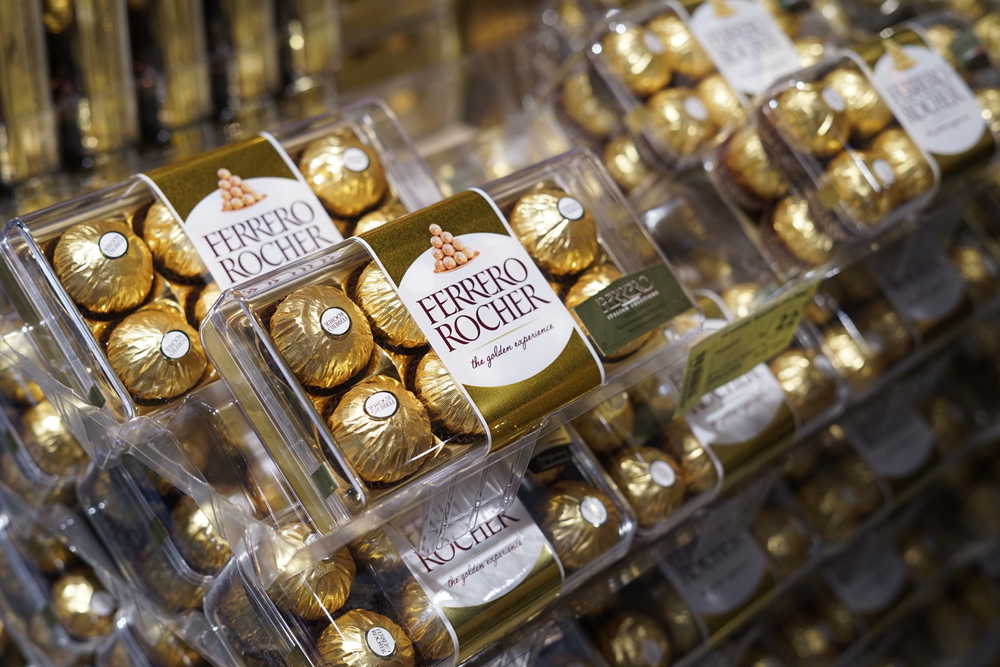Most Ferrero chocolates halal-certified, all factories to be halal ‘in two or three years’
DUBAI - Family-owned Italian chocolate company Ferrero has said that 33 of its products and 19 of its plants are already halal-certified, a number that is set to grow.
“We have only few factories that are not certified. In two or three years all our factories will be halal,” Moutaz Abdullat, General Legal Counsel of Ferrero Gulf Countries told Salaam Gateway. Ferrero operates 25 plants, according to its most recent available annual report.
This is the first time the maker of Ferrero Rocher, Nutella, Kinder, Tic Tac and Ferrero Pralines has made public its halal credentials despite starting on the halal track around a decade ago.
“Our halal journey began in 2009 with two plants being certified. By 2016-17, the number reached 14 and by 2019-20, 19 plants are expected to be halal-certified. In 2009, only four products were halal-certified. In 2018, 33 have the certification,” said Abdullat at the International Halal Industry Forum in Dubai on February 18.
All Ferrero products in the Middle East are halal, said Abdullat.
“We don’t have a factory here in the Middle East but our factory in Poland or in Italy produce the halal product. Halal requirement is not just for the product but for the factory line and the process,” said Abdullat.
The company also says on its website that in some parts of the world, several Tic Tac flavours are kosher and halal-certified.
“We, as a company, anticipated halal. We knew that we need to do this now or later. We started the process and did it globally,” added Abdullat, saying that consumers in countries such as Indonesia, among others, demand halal certification.
Ferrero announced a turnover of 10.7 billion euros ($12.15 billion) for the year ended August 31, 2018, with 94 companies worldwide, and 25 operating manufacturing plants.
The Group’s products are present directly or through authorised distributors in over 170 countries.
HALAL CERTIFICATION ‘PAYS OFF’
“We are living in a small world. This (halal) pays off the investment,” said Abdullat, reiterating that customer trust in the quality of the product is crucial.
Chocolate products often do not contain animal products. However, halal certification of a chocolate means that it has been tested and analyzed to ensure it does not contain any impermissible ingredients. When products that may originate from impermissible sources are used, such as rennet and gelatin, companies often specify that these are halal-certified or halal ingredients.
When companies do not offer reassurance or certifications that their products are halal, consumer groups tend to approach them for clarification on each product.
U.S.-owned Hershey’s, for example, has said its chocolates manufactured in Malaysia and China are certified.
Many other global names have long embraced the halal requirement in order to comply with regulation and consumer demand in their markets.
Nestlé claims to be the biggest halal producer in the world, exporting halal products from its eight factories to over 50 countries worldwide.
As chocolate companies target newer markets, products that suit local sensibilities are required and halal certifications helps pave the way to consumer hearts.
Mondelez International, which owns brands such as Cadbury Dairy Milk, Toblerone, Oreo, Chipsmore and Twisties won the Best Halal Chocolate Bar at the Asia Halal Brand Awards 2017 (AHBA). Cadbury Dairy Milk chocolates are certified halal by the Department of Islamic Development Malaysia (JAKIM) since 2004.
In a statement, Swadheen Sharma, Managing Director of Mondelez Malaysia said: “We understand how important halal is to our consumers. Ensuring that all our products made here in Malaysia are halal is something that we take very seriously.”
BACKLASH
However, while global names continue to seek halal certification, labelling or even compliance with halal specifications can cause Islamaphobic or right-wing backlash in some countries.
Cadbury Australia, for instance, does not label its halal-certified candy and chocolate products, listing them instead on its website, with a detailed FAQ, explaining, among other things, that: “There have been no changes to these products; they were always inherently halal. As well, there is no religious ritual involved in making these products”.
Cadbury UK faced a backlash for “Muslim appeasement” which had its own thread on twitter #prayforcadbury.
In Australia, Cadbury explains: “Certification on these products is generally because some of our business customers, such as airlines, hospitals, clubs and other organisations providing professional food service, require halal food for their customers. For this reason, they require suppliers such as Nestlé to have halal certification as independent confirmation that the food meets this standard. Without halal certification, we are not able to supply to these customers.”
Most recently, in April 2018, Toblerone, a Mondelez-owned brand, announced it received halal certification, immediately sparking blowback from groups which called for boycotts despite the fact that it did not label its products as halal.
So far, Ferrero has stayed away from controversy. “It’s a food product. It’s meeting the requirement of halal. Luckily, we did not face such things,” said Abdullat.
(Reporting by Shalini Seth, Editing by Emmy Abdul Alim emmy.alim@refinitiv.com)
© SalaamGateway.com 2019 All Rights Reserved

Shalini Seth, White Paper Media